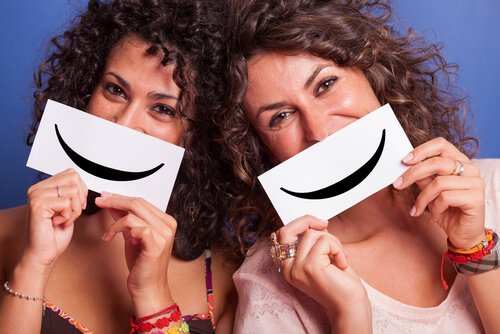Humor as Therapy Against Stress

Humor is a natural therapy against stress. When you have a light heart, then the big problems don’t seem as big and the people who may intimidate you become less important. In this regard, you can liven up any evening and brighten up any cloudy day. Thus, humor is fundamental to everyone’s well-being.
Even though humor is about fun and leisure, science has shown that in some cases, humor complements post medical intervention treatments and greatly improves the results. An ingredient that makes it dynamic at times. At the same time, this way of communication is great for establishing a good rapport and trust between a doctor and their patients.
When we laugh, we experience the following effects:
- Firstly, the brain reward circuit activates. So, endorphins and dopamine are released –these are hormones related to well-being and happiness.
- Next, there’s a decrease in the levels of cortisol, the stress hormone, by the activity of dopamine and endorphins.
- Then, the muscles relax, especially the facial ones.
- And, there’s an increase in feelings of tranquility and security.
- Finally, the sensation of pleasure and relaxation distract us from problems and worries.
Humor as therapy
Further, Professor Heidi L. Fritz of Salisbury University devoted much of her professional career to studying the relationship between humor and stress. The results of her investigation state that the more pronounced a person’s sense of humor is, the lower their level of stress.

“A sense of humor is the best indicator that you’ll recover; it’s often the best indicator that people will love you. Sustain that and you have hope.”
― Andrew Solomon ―
Beyond laughter
Laughter is the most visible consequence of humor, although there are others. In addition, humor as therapy should neither be confused with a lack of seriousness, nor with sarcasm and cynicism, nor euphoric high.
Humor’s real usefulness lies in the fact that it forces us to see things from a different point of view. It acts as one of those mirrors that distort the reflections. At the same time, it can show you the possibility of adding changes to the filters you use to perceive and process information.
We can say that humor aims to create happiness. Even when adversity is all around you. Even if it’s just for a moment, a sense of humor can stop the flow of negative thoughts in your mind. One simple second is often enough to get out of your vicious circle and stop feeding these negative feelings.
The challenge of the most emotionally intense professions
Health professionals who work in ERs, police officers, and firefighters face very complicated situations daily. They are all at places of high tension. Their work is often just what causes emotional imbalances to them.
The harshness of the situations they face every day lies mainly in their involvement with other people who are facing all sorts of adversity. For example, a doctor who works at an ER has to make important decisions in a short amount of time.
This is often without having all of the necessary information in regard to what happened to the injured people they attend. And even assuming the risk of doing more damage as a consequence. For example, moving or not moving a person at a certain moment could either cause paralysis or save their life
In these cases, humor can be the therapy that helps lower stress levels once a decision is made and before the appearance of the next difficult moment.
The crucial role of humor as therapy in emergencies
The benefits of using humor as therapy in these contexts:
- Using humor to nurture your well-being and to increase your performance, in the short and long term, will allow you to ignore the unsightly. Also, to tone down the rudeness of certain situations and lower despair. It helps to take control of the situation, mitigating its impact.
- Humor is a great tool to relate to your colleagues. The complicity in situations of stress among members of a work team plays an important role in their performance and cooperation. In addition, the climate of trust that it generates facilitates the expression of emotions in later moments.
- Humor is also a good tool for building relationships with patients. For a person who’s in a very stressful situation and who can’t do anything (as when you call an ambulance and are waiting for it to arrive), humor can be an emotional lifesaver.

Humor is good when it’s sensitive to the context
It’s as important to use humor in situations where you can lower your tension as it’s to refrain from getting into situations where you would only increase it. People are unique in this regard. And so is every circumstance that surrounds us at any given moment. It requires constant observation and adaptation in a very dynamic environment.
Thus, the use of humor as an element that can generate all the benefits described above requires intelligence and the careful selection of moments of mutual empathy and respect. It would be counterproductive otherwise. So, when in doubt, use it little by little and see how others respond to it.
Humor, within the framework of therapy and outside of it, is a very powerful ally when used intelligently.
Humor is a natural therapy against stress. When you have a light heart, then the big problems don’t seem as big and the people who may intimidate you become less important. In this regard, you can liven up any evening and brighten up any cloudy day. Thus, humor is fundamental to everyone’s well-being.
Even though humor is about fun and leisure, science has shown that in some cases, humor complements post medical intervention treatments and greatly improves the results. An ingredient that makes it dynamic at times. At the same time, this way of communication is great for establishing a good rapport and trust between a doctor and their patients.
When we laugh, we experience the following effects:
- Firstly, the brain reward circuit activates. So, endorphins and dopamine are released –these are hormones related to well-being and happiness.
- Next, there’s a decrease in the levels of cortisol, the stress hormone, by the activity of dopamine and endorphins.
- Then, the muscles relax, especially the facial ones.
- And, there’s an increase in feelings of tranquility and security.
- Finally, the sensation of pleasure and relaxation distract us from problems and worries.
Humor as therapy
Further, Professor Heidi L. Fritz of Salisbury University devoted much of her professional career to studying the relationship between humor and stress. The results of her investigation state that the more pronounced a person’s sense of humor is, the lower their level of stress.

“A sense of humor is the best indicator that you’ll recover; it’s often the best indicator that people will love you. Sustain that and you have hope.”
― Andrew Solomon ―
Beyond laughter
Laughter is the most visible consequence of humor, although there are others. In addition, humor as therapy should neither be confused with a lack of seriousness, nor with sarcasm and cynicism, nor euphoric high.
Humor’s real usefulness lies in the fact that it forces us to see things from a different point of view. It acts as one of those mirrors that distort the reflections. At the same time, it can show you the possibility of adding changes to the filters you use to perceive and process information.
We can say that humor aims to create happiness. Even when adversity is all around you. Even if it’s just for a moment, a sense of humor can stop the flow of negative thoughts in your mind. One simple second is often enough to get out of your vicious circle and stop feeding these negative feelings.
The challenge of the most emotionally intense professions
Health professionals who work in ERs, police officers, and firefighters face very complicated situations daily. They are all at places of high tension. Their work is often just what causes emotional imbalances to them.
The harshness of the situations they face every day lies mainly in their involvement with other people who are facing all sorts of adversity. For example, a doctor who works at an ER has to make important decisions in a short amount of time.
This is often without having all of the necessary information in regard to what happened to the injured people they attend. And even assuming the risk of doing more damage as a consequence. For example, moving or not moving a person at a certain moment could either cause paralysis or save their life
In these cases, humor can be the therapy that helps lower stress levels once a decision is made and before the appearance of the next difficult moment.
The crucial role of humor as therapy in emergencies
The benefits of using humor as therapy in these contexts:
- Using humor to nurture your well-being and to increase your performance, in the short and long term, will allow you to ignore the unsightly. Also, to tone down the rudeness of certain situations and lower despair. It helps to take control of the situation, mitigating its impact.
- Humor is a great tool to relate to your colleagues. The complicity in situations of stress among members of a work team plays an important role in their performance and cooperation. In addition, the climate of trust that it generates facilitates the expression of emotions in later moments.
- Humor is also a good tool for building relationships with patients. For a person who’s in a very stressful situation and who can’t do anything (as when you call an ambulance and are waiting for it to arrive), humor can be an emotional lifesaver.

Humor is good when it’s sensitive to the context
It’s as important to use humor in situations where you can lower your tension as it’s to refrain from getting into situations where you would only increase it. People are unique in this regard. And so is every circumstance that surrounds us at any given moment. It requires constant observation and adaptation in a very dynamic environment.
Thus, the use of humor as an element that can generate all the benefits described above requires intelligence and the careful selection of moments of mutual empathy and respect. It would be counterproductive otherwise. So, when in doubt, use it little by little and see how others respond to it.
Humor, within the framework of therapy and outside of it, is a very powerful ally when used intelligently.
This text is provided for informational purposes only and does not replace consultation with a professional. If in doubt, consult your specialist.







